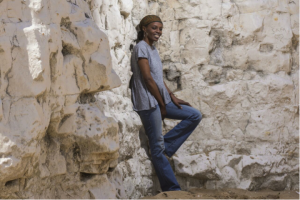The yam was cooked.
Ore, refusing to use a dish cloth, removed the pot from the cooker and set it on the worktop next to the bowl of ground pepper, tomatoes and onions. On opening the pot the steam wafted to the ceiling, disintegrating in the atmosphere. There was still enough water in the pot, she said to herself, that will keep the yam moist until she finished preparing the fish stew.
The playful banter of children from outside drew her attention to the kitchen window just in time to see Bolu running across the road meandering the yellow taxis which were at a near standstill.
Bolu held a parcel neatly wrapped in newspaper. He hadn’t bought a plastic bag. She constantly reminded him to always buy a plastic bag whenever she sent him to buy anything from the market.
“Two hundred and fifty naira should be enough for two mackerel. Make sure you buy a plastic bag so that it doesn’t thaw quickly.”
Ok ma, I will.
He didn’t. From the size of the parcel Ore sensed that the fish would not be enough to feed everyone. He would have to go back. Kewa would go with him. Kewa was an expert at haggling. She was only 14, but her mother had taught her well.
Mama Kewa loved to boast, “Ah my Kewa will make someone a good wife someday. All my work on her will not be in vain.”
Modesty is the beauty of women.
Bolu, don’t wash the dust of your feet. You need to go back to the market. And this time buy a plastic bag.
Ok ma, I will.
Ore placed the fish in the fridge knowing that the instruction had entered his right ear and quickly found its exit through the left one. As soon as he bought the fish, Bolu would hurry back home in time to continue the football game he had so unceremoniously been dragged away from.
Placing another stainless steel pot on the cooker Ore measured in a large spoonful of palm oil. The smoke travelled to the kitchen ceiling. In an attempt to stifle her cough, her eyes began to squint. Ore was afraid to open them for the effect of the smoke and afraid to close them, not knowing where the smoke might take her—back to her mother’s kitchen, perhaps.
***
It was a large communal kitchen built at the rear of the two-story house. The corrugated iron roofing had turned the same dark brown of the walls. Around the wooden gate the chickens pecked at the ground in search of stray rice grain to satisfy their hunger. Each wife had etched out their territory. Their own pile of firewood securely placed by their tripod. ‘Iya Ore,’ as her mother was popularly known seemed to be the main occupier. Always stirring something, boiling something, Akara frying in hot palm oil, the pestle having continuous contact with the mortar.
Iya Ore let’s eat pounded yam and not eba.
Iya Ore the children will be back from school soon. They will be hungry.
Make sure you get an education so that you do not end up in the kitchen for the rest of your life.
Ore, as young as she was would hang on to every word, yearning for the day when she would come home with a bag bursting at the seams with textbooks for various subjects. Maths, English, Physics, History.
When will I be able to start school, she would ask. When will I be old enough?
You, start school? Her half siblings would snigger “by the time you are old enough to go to school Baba will not have enough money to send you.”
Why, I want to go to School as well.
You are the daughter of the youngest wife. There are a lot of children in front of you.
Mummy what do they mean?
Family means no one gets left behind or forgotten.
Ore sat at the edge of the bed her legs inches away from the floor, swinging back and forth. Her mother lay beside her. Face to the wall, eyes open. Bending over her Ore saw the tears mixing with her eye makeup. The grey smudges eventually caused a “y” on her mother’s cheeks all swollen and gave her eyes that funny color.
Why are you crying mummy? Did somebody hurt you?
Don’t be so much in love that you cannot tell when it is raining.
***
The call came during her Physics 204 lecture. She left the lecture room in order to answer the phone.
Come and bury your mother o! She is dead.
The phone succumbed to gravity, shattering on impact.
***
The ramshackle taxi meandered the potholes splattered across the road. Roadside dust coming through the half lowered windows settled in Ores hair. She knew the dust would not come out easily. All the braids would have to be taken out. She would have to do it before the burial. The taxi parked in front of the compound. The relative tranquillity of her inner mind was broken by the incessant talking in the compound.
Who has gone to the market?
Someone needs to start peeling the yam.
People are arriving. They will need to eat.
Two goats tethered to the iroko tree are grazing, oblivious to their imminent fate. Heated palm oil had already supplied two batches of akara. Pots of different sizes were being carried by women and children alike.
Everyone had a task. Organized chaos.
Sister Ore welcome. So sorry about your mum. Let me take your bag to your room.
The bed had been moved to the other side of the room. Stripped of bedsheets, the mattress had attracted a layer of dust. A smile crept to Ore’s lips. Mum liked it on that side. Ore always preferred it beside the window. It allowed her to have quick access during the night to alter the window when the weather changed.
Swollen cheeks and funny colored eyes.
Mama Kitan thought the television would be of better use in the parlor where everybody could use it.
What about the fan and the fridge?
They broke last week, so Mama Gbenga took them.
How conveniently, Ore thought and turned to face the house boy.
So what happened? She was okay last week. I spoke to her. She was fine.
Ah sister, intently picking the scab at the corner of his mouth and shaking his head.
We don’t know. One minute she was good and then she complained that she had stomach ache.
Did Baba take her to the hospital?
He said he would do it when he returned from Ilorin.
What about Mama Gbenga and Mama Kitan. What did they do?
No one wanted to help. They all talked about her when she wasn’t around.
What were they saying?
Sister Ore, please don’t tell them that I said anything or they will send me back to my village.
What did they say?
The house boy opened the door and poked his head through, scouring the corridor to make sure no one was listening. He returned to the room and firmly shut the door behind him.
Sister Ore, Baba beat her.
Swollen cheeks and the funny colored eyes.
Ore looked through the houseboy.
He said that her soup wasn’t as sweet as the other wives, that she always cooked him pomo, never cooking meat and chicken like Mama Kitan.
Did he beat her just before she became sick?
Ah sister everyone was begging for her, but Baba didn’t listen. He said he paid her bride price. He could do anything he liked to her.
Ore sat on the bed staring at the closed door.
***
She returned to campus immediately after the burial.
Her professor empathized with her allowing extra time to complete her overdue essays. Meetings were arranged in his office in the faculty block to explain elements of the lectures she had missed. The meetings became more frequent and began to last later into the night.
She began sleeping well past midday. Her incessant tiredness caused her to miss more lectures.
She is probably still missing her mum her roommates whispered.
The professor sent his driver to pack her stuff.
He promised she would return to the university as soon as the baby was weaned.
If you do not plan your life your life will become someone else’s plan
***
Bolu ran into the kitchen, throwing his parcel on the table and immediately running out to the courtyard resuming his position as goal keeper.
Ore knew he would soon be back. He had the knack of knowing when the food would be fully prepared entering the kitchen at least ten minutes before his half brothers and sisters.
Why do you always manage to get to the kitchen early?
But mum you are in charge of the food and the kitchen. So I should be the first to eat.
Iya Bolu have the children eaten yet? Their afternoon lesson is due to start.
Iya Bolu will the yam be enough? If not you will have to cook more.
If you want the respect of a first wife, do not get pregnant for another woman’s husband
*************
Post image by Surian Soosay via Flickr.
About the Author:
 Bunmi Anjorin-Kogbe Has a degree in English Language from University of Lagos and a Masters in Applied Linguistics from University of London. Currently she lives in the United Kingdom. She loves to write short stories
Bunmi Anjorin-Kogbe Has a degree in English Language from University of Lagos and a Masters in Applied Linguistics from University of London. Currently she lives in the United Kingdom. She loves to write short stories










Tee Azanor May 03, 2016 18:05
I'm a fan. I love your subtle, simple style of captivating your reader. Kudos for not diving into the murky details of Bolu's and her Mother's ordeals. Any hope for a sequel? Toyin.